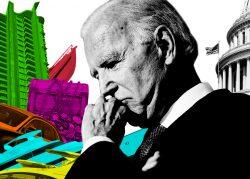Hiring at restaurants, bars and hotels slowed in April, falling about 20 percent from March, according to government figures released Friday.
Still, leisure and hospitality, the industry most affected by the pandemic, hired more workers than any other last month as the overall economy added a robust 428,000 new jobs. The unemployment rate remained unchanged at 3.6 percent, the government said.
It was “another strong month of job growth,” said Mike Fratantoni, chief economist for the Mortgage Bankers Association, noting that job growth has averaged 523,000 in the past three months. That is “much faster than can be sustained,” he cautioned in a statement.
In a promising sign for office landlords, the data showed people are returning to their desks. The number of employed people working at home fell in April to 7.7 percent, down from 10 percent in March.
Jamie Dimon, CEO of JPMorgan Chase, recognized in a letter to shareholders last month that “working from home will become more permanent in American business.”
The bank expects about half its employees to work in-person full-time, while 40 percent will embrace a hybrid model and 10 percent will work from home full-time.
Read more

Manufacturing saw the second strongest job growth, adding 55,000 positions, while retailers grew their headcount by 29,000 to reach 284,000 jobs above its pre-pandemic level.
Employment in leisure and hospitality remains 1.4 million, or 8.5 percent, lower than in February 2020.
Some 17,000 people were hired last month to work at warehouses or storage facilities. That sector remains well above pre-pandemic employment levels. Amazon, however, will halt its aggressive strategy to buy and staff industrial real estate after booking a $3.8 billion loss on its investments there.
While wages are rising slower than inflation, the robust labor market is likely to support already strong demand for housing, according to Fratantoni.
Despite rising interest rates, “we expect that many potential homebuyers will continue to be in the market, given their strong financial position,” he said.
